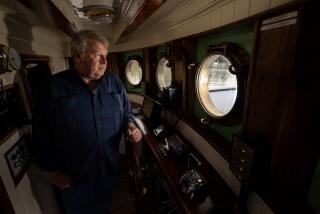All the Ancient Mariners
- Share via
She lumbers out of port like an old woman with a walker, nosing tentatively into the motionless gray fog.
Music from a public address system plays a wartime “I’ll Be Seeing You” as she clears the harbor and sets sail on a western course, watching for enemy U-boats, sensing danger from the air.
The ship is the S.S. Lane Victory, a relic from battles fought long ago, and her crew consists of the men who manned just such ships in those terrible times of U-boats and kamikaze attacks.
They were civilian sailors then, and now in their 70s they’re members of an organization trying to keep the memory of their efforts alive, even as they themselves slip quietly into history.
Their link with the past is the 50-year-old Lane Victory. It was lobbied out of mothballs six years ago and restored by the volunteer work of those who sail her today, members of the U.S. Merchant Marine Veterans of World War II.
Periodically, they take her out to sea, undergo an ersatz aerial attack and try to convey to a shipload of paying tourists what it was like back then when 700 U.S. merchant vessels were sunk at war and almost 7,000 seamen died.
They call it a “nostalgia cruise,” but it’s more a reminder of how time coats even the most desperate battles with a patina of glory and hides the pain that old men remember when the lights are out and the nights are dark.
*
My first reaction to an advertisement that promised “a Hollywood spectacular” aboard the Lane was disbelief. War-as-fun is the ultimate insult to those who fought it and distorts the nature of the losses that human conflict creates.
A man I knew who’d been a prisoner of the Nazis went crazy every time he saw “Hogan’s Heroes” on television, and for years I had a hard time watching “M.A.S.H.” I never had that much fun in Korea.
But war is also a compelling attraction to those who have never been in one, and thousands flock for safe glimpses at theaters, at historic re-creations, at monuments, at ancient battlegrounds, and sometimes at sea.
They were there this day aboard the old Lane, about 300 strong, drinking beer and pink wine as vintage aircraft dived and strafed and the guns of the gray lady fired blanks in response.
The Lane was built 50 years ago, one of 534 victory-class cargo vessels that were tougher and faster than the liberty ships that preceded them. It hauled arms and materials in World War II, the Korean War and the Persian Gulf War and was headed for a scrap heap when the veteran seamen saved it.
Capt. Larry Welsh was in command on this day, as the Lane slipped out of the harbor at San Pedro. A trim and weathered 77, he’s been a sailor since 1937 and was aboard a ship 20 miles off Pearl Harbor when Japanese planes roared over Oahu more than half a century ago.
He feels his age and wonders at the compulsion that keeps him doing this, but then decides it’s probably good for him. “Old sailors are like old ships,” he said to me from the bridge of the Lane. “It’s better to run us than to let us sit idle. We last longer.”
*
It would take a book to recount the wartime experiences of those who sailed the Lane this damp Saturday morning. The fog added mystique to the venture and fueled their recollections, as though by sailing into the mist the Lane was sailing into its own history.
Hans Philipsen is not untypical of those aboard. He spent 61 years at sea before he retired and has sailed most of the oceans of the world. But it’s the years at war he remembers most.
Four times the ships he served on were sent to the bottom of the Atlantic by German torpedoes in a calamity of flame, hissing steam and the cries of shipmates lost in the darkness.
“One ship sank in a minute-and-a-half,” he said to me as we stood on the deck of the Lane near the end of the day. “The first torpedo hit midship and threw me from my bunk. The second hit aft by the number five hatch. I got a bump on the head, that’s all. We were young. We thought we would live forever.”
The cruises of the Lane are, I guess, links to forever, memorializing the civilian sailors who went down to the sea in a tradition as old as human incentive.
And while I could probably do without having fun celebrating the good old days of war, there is a kind of dignity to the ancient mariners who continue to live out their memories.
In terms of the peril they once faced, we owe them more than a day at sea to get them through the long nights of their past.
More to Read
Sign up for The Wild
We’ll help you find the best places to hike, bike and run, as well as the perfect silent spots for meditation and yoga.
You may occasionally receive promotional content from the Los Angeles Times.






